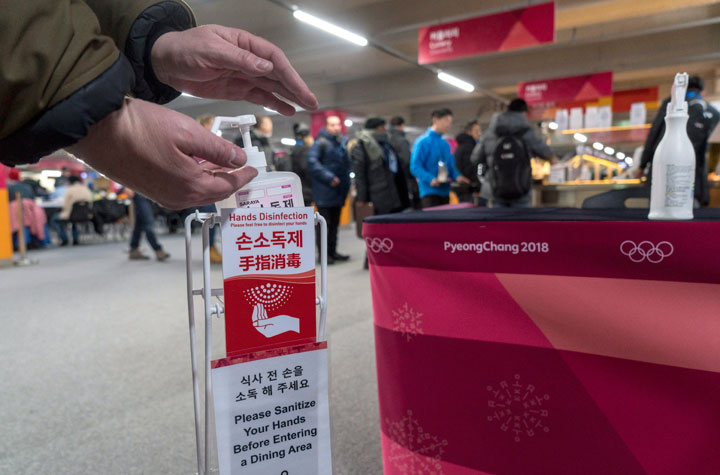An outbreak of norovirus at Olympic venues in PyeongChang, South Korea, appears to be spreading, with the number of cases more than doubling overnight.

On Tuesday, organizers reported 32 cases of the stomach bug. On Wednesday, they said there were an additional 54 cases, bringing the total to 86.
So far, the illness appears to be confined to security staff as well as three food handlers in the media village. The virus can be spread through food and water contamination and causes severe diarrhea and vomiting.
No athletes are among the 86 confirmed cases so far and officials at the Winter Games say they are doing everything they can to ensure it stays that way, two days before the Olympics open. Any illness spreading to the competitors — particularly an international star — would be a major embarrassment to host South Korea, as it could prevent an athlete from competing or leave them weak after an infection.
WATCH: Canada House, the home away from home for Canadians and the country’s athletes during their time in PyeongChang, officially opened Wednesday. Reid Feist has more from South Korea.

“There’s no confirmed cases (among athletes) and that’s the most important thing here, that when the athletes come to Korea they demonstrate their performance after a few years of training,” said Kim Hyun-Jun, director of the Korean Centre for Disease Control and Prevention.

Get daily National news
“In order to prevent any kind of accident that will prevent them from competing well and enjoying the Games we’re doing our best.”
Organizers are quarantining patients for 48-72 hours and rushing batches of hand sanitizer to the venues.
They also quarantined 1,200 security staff, replacing them with soldiers, after it appeared that the outbreak was concentrated among the private security guards. The guards were all staying together at a youth training centre in PyeongChang, which is now believed to be the epicentre of the outbreak. The centre was separate from Olympic venues.
Norovirus is the common name for a group of viruses that generally cause diarrhea and/or vomiting. The virus is found in the stool or vomit of infected people and is very contagious, says the Public Health Agency of Canada. It’s commonly spread through direct contact with an infected person, touching surfaces or objects contaminated with the virus or eating infected food or drinking contaminated water.
“Most foodborne outbreaks of norovirus illness occur when food is contaminated by food handlers who have the virus, especially if they don’t wash their hands properly after using the bathroom,” said PHAC on its website.
People usually develop symptoms within 24 to 48 hours of being infected, but can be contagious for much longer – three days at minimum. Norovirus is generally more unpleasant than dangerous, though people with weakened immune systems or the very young or old may develop dehydration as a result of diarrhea.
–with files from Agence France-Presse


Comments